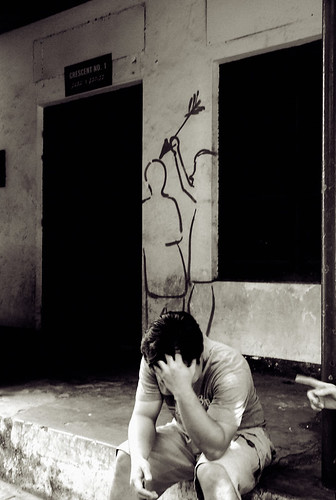We run our website the way we wished the whole internet worked: we provide high quality original content with no ads. We are funded solely by your direct support. Please consider supporting this project.
The Witness of Graffiti (Rocks Crying Out)
On this eve of Easter, we wanted to share something that fit the mood of the time between the crucifixion and the resurrection. D.L. Mayfield wrote this striking piece on the longing for the Kingdom of God in the midst of overwhelming brokenness. We thought it was the perfect reflection for this day suspended between grief and celebration.
From her reflection:
I think Jesus meant it all: that his coming, his way, his kingdom was marked both by celebration and anguish. He knew, more intimately and more deeply than we could ever imagine, the joy of his father’s heart and the suffering of what happens when we purposefully thwart it. He knows about me, my neighbors, this city—how the redemption is so real and good and possible (the rocks cry out) and how the hearts of the broken are barely holding on, while we keep trying to build our own safe fortresses high above the muck (the rocks cry out). He knows it all; and perhaps this is what he was thinking as he looked over Jeruslalem and wept.
In my neighborhood you can’t walk a block without seeing paint splashed on the walls. Some are joyful, hopeful and prophetic. Others are chilling, territorial, anguished. The rocks are crying out, just as Jesus said they would.
Related Reading

God Became a Zygote
Has the Christmas story become so familiar that you’ve lost any sense of how spectacular it is? The great creator of the universe became a microscopic zygote. The all-powerful being who spoke the stars into existence came in a very small and vulnerable way. He crossed an infinite distance to become one of us. You can watch…

The Old Testament Is NOT on the Same Plane as the New Testament
Paul taught that unbelievers are blinded by “the god of this age” when they read the OT such that “their minds are made dull” and a “veil covers their hearts…when the old covenant is read” (2 Cor. 4:4; 3:14-15). This is why they are unable to see “the light of the knowledge of God’s glory…

Spiritual Warfare: What is it?
The Kingdom is “not of this world,” and neither is its warfare. Jews had always believed that God confronted spiritual opposition in carrying out his will on earth. In the Old Testament, these evil forces were usually depicted as cosmic monsters and hostile waters that threatened the earth. For a variety of reasons this belief…

How Are We To Love the Soldiers of ISIS?
Over the last several weeks I’ve received some form of this question almost every day. In some cases the question is asked rhetorically, as though the very question exposes the absurdity of suggesting we are to love this terroristic group. Other times the question is asked with a pragmatic twist. One person recently said to…

Following Jesus from the Margins
D. Sharon Pruitt via Compfight Kurt Willems posted a reflection today entitled From the Margins: Following Jesus in a post-Christian culture. I hope everyone will read this. It’s a perspective from the anabaptist tradition that finds inspiration from the same data that evangelicalism finds alarming. May we all follow Jesus from the margins and offer…

Eye for Eye: That Time Jesus Refuted An Old Testament Teaching
One of the most surprising aspects of Jesus’ teaching is that, while he clearly shared his contemporaries’ view of the Old Testament as inspired by God, he was nevertheless not afraid of repudiating it when he felt led by his Father to do so (Jn. 8:28; 12:49-50; 14:31). For example, while the OT commands people…

